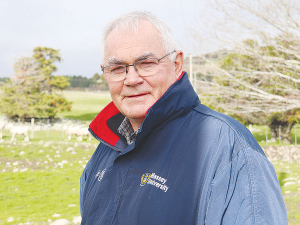Of all the projects Massey University's School of Agriculture has been involved in over the years, it's never had such interest as it has in its Wiltshire breeding programme.
That claim was made by the head of Massey's agriculture department Professor Paul Kenyon at a recent field day held at its Riverside Research farm, near Masterton, in the Wairarapa. Close to 100 farmers and rural consultants from around the North Island turned up to hear presentations by top Massey scientists on the project to build up a flock of self-shedding sheep using Wiltshire rams crossed with Romney ewes.
Kenyon says the turnout exceeded their expectations – given the project is in its very early stages and there is not a lot of data to share. As well as hearing the presentations, field day attendees had a chance to see the first crosses from the programme, which are due to lamb in the spring.
Kenyon says Massey has been involved in a number of projects over the year. In the late 1990s, it was lambing out of season, in the early 2000s it was triplets and then mating hoggets.
“While there was a lot of interest in these projects, we have never seen the level of interest from farmers who are contacting us by email and phone all the time to learn more about this project,” he told Rural News.Kenyon doesn’t think the interest in self-shedding Wiltshires is because farmers are necessarily over wool.
He believes they still regard wool is a good quality product and are very proud of that.
“But it just comes down to the economic sense of it at the moment because of the costs of dealing with wool – including the price of shearing, which is likely to go up,” he explains.
“Also, the extra labour costs over the summerautumn period – including crutching, dipping and fly control. With less labour on farm, you can do other things – such as improving the performance of the farm or go to the beach.”
Kenyon says Massey is not suggesting that all farmers should go to Wiltshires, but it wants to provide quality information so that farmers can make informed decisions. He says farmers are very much focused on obtaining good data, because any decisions they make is going to impact on their farm over many years.
“More and more they are relying on people to give them information to help them make informed decisions to take some of that risk away from them,” he says.
The Project
Heading the Wiltshire project is Professor Steve Morris, who told those attending the field day that one of the reasons for initiating the science project was the lack of accurate data on upgrading to Wiltshire sheep.
He noted, for example, the costs incurred in upgrading lamb production levels, the proportion of animals that shed at each backcross and other benefits – such as animal health and welfare and production levels.
Morris says the objective of the project is to upgrade Romney type sheep to fully shedding Wiltshires.
“The scientific literature just hasn’t happened over the years because there are very few Wiltshire sheep in the world,” he told Rural News. The project at Riverside is about generating first, second, third and fourth cross sheep and seeing what the production consequences are of going down that route.”
Morris says that once wool dropped below a dollar, the team wondered what wool’s future might look like. He says the Wiltshire has a good reputation as a meat breed because its carcass is big and lean and has links back to the Poll Dorset – another good meat breed. But Morris says today’s interest in the breed is not so much about its meat, but rather its shedding gene.
“Everyone is trying to get the shedding gene and so you have got to try and compromise. If you want it to shed, that’s number one and we are just trying to find out that if you select for that shedding gene what else is happening,” he explains.
“There is whole lot of things out there that might happen and we don’t know what will happen, but you have got to do something. The wool price is so low that shearing is just a welfare thing nowadays.”
Morris says Massey intends to run field days at least once a year to give farmers and others interested an update on the project.



















